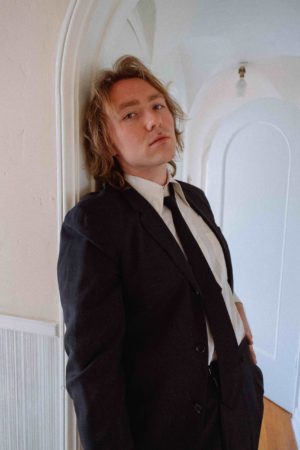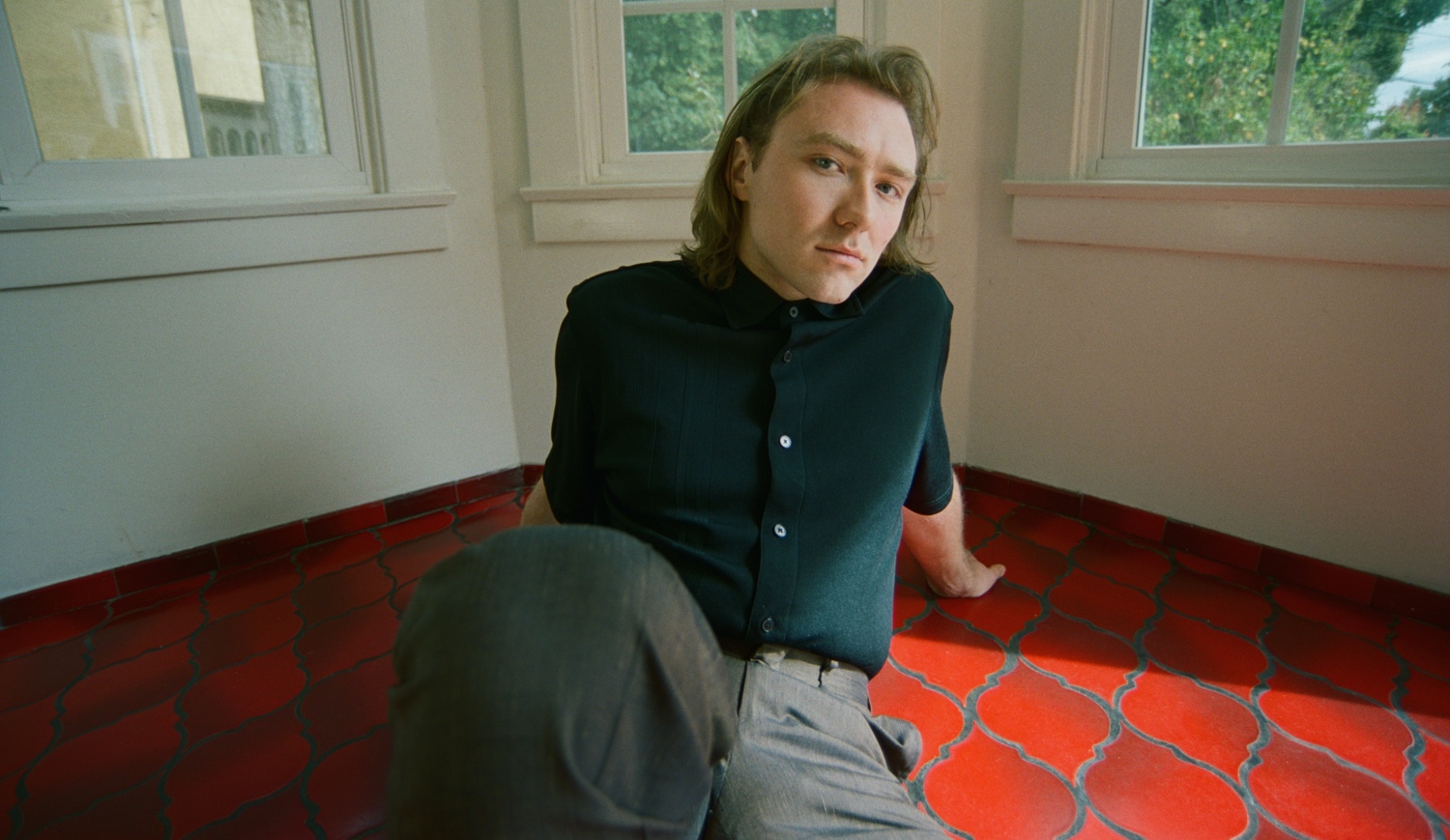Current Joys’ frontman Nick Rattigan is not used to sitting still. Whether he’s releasing music under his solo moniker or alongside Jacob Rubeck as Surf Curse, Rattigan is almost always in the throes of the album cycle and its ensuing tour whirlwind. That is, until everything abruptly stopped, and Rattigan had nothing but time; time to be alone, time to breathe, time to think. Perhaps it’s a bit ironic, then, that the album that emerges on the other side is not only Current Joys’ most inclusive and collaborative yet, but their most decisive as well, as if Rattigan prepared for the strangest year in our collective lives by making the perfect album to welcome us back.
For all the success of his previous output, Voyager marks a new high point for Rattigan, who unfurls sixteen songs of the best music he’s ever written. Where his last record A Different Age used repetition and expansion to create an allusive palette of time and space, this record attacks things directly, embracing anxiety and pain head on. “Play me something sad, but just happy enough to dance,” sings Rattigan on standout “Big Star,” perhaps perfectly encapsulating his own brand of hangdog charm.
We recently spoke with Rattigan about, among other things, working through writer’s block, defeating Pennywise the Clown, and embracing collaboration.
You’ve been touring pretty steadily over the years, not only as Current Joys but with Surf Curse as well. How has it been to be off the road for over a year now?
Horrible, it sucks. Touring is kind of awful itself—you establish this thing, which is totally unhealthy for a human being, where you drop everything in your life and you go drive for a month or so. You get into this really weird pattern of living, but then all of a sudden it stops and you go back to your life. Yyou have nothing to do and you reestablish what you do with your days, kind of changing your entire lifestyle overnight. Then you do it again when you’re back on tour. It’s this weird ping-pong effect of doing everything and nothing at once. So I thought I got really good at that, but when you’re stuck in one phase for a year and half you run out of steam a bit, I guess.
You’ve talked a little bit about having writer’s block when working on your last record, A Different Age, but with 16 songs on this record, it feels like maybe that wasn’t quite the case this time around?
A Different Age was kind of the writer’s block album. I couldn’t write anything so I wrote that. Then, I don’t know, the wheels just really started turning again. I actually thought I had a full album and an EP this time around. It was the first time going into the studio with Current Joys and spending a ton of money, so I thought, “Well, if I am going to spend all this money I’m just going to record every song I’ve written in the past two and a half years.” But then I thought, “You know what, all this can just be one album.”
“I think any sort of struggle is a productive thing. You have to find your different path, relax, and stop clenching.”
It seems like maybe the struggle to get through A Different Age might have helped loosen things up this time around. Did you make any changes to your approach after going through that?
I think any sort of struggle is a productive thing. You have to find your different path, relax, and stop clenching. I guess on a deeper, self-conscious level things might have changed, but I always try to not approach things at all. Most of the stuff that is worthwhile comes to you, you just have to be patient. When you’re looking at that blank page it doesn’t help to question yourself too much, it’s just another voice in the room.
You’ve talked a lot about how movies have influenced you as much as music—what is it about crossing boundaries between two different mediums that helps to inspire you? Is there any connection between some of the song titles on Voyager—“American Honey,” “Altered States,” “Shivers”—and the films from which you borrow the names?
I’m just very moved by some movies, but my form of spiritual communication is music, so instead of going out and writing a script or making something visual about it, I make it through music. It’s all probably something happening on a deeper level there, something you can’t quite explain. As far as the titles go, it’s a very unclever way of stealing something. Most people steal stuff to influence or shape their art, but I think it works because it’s across mediums, so I don’t quite have to hide it so much. Normally, if a movie makes a song title, it’s usually something I watched that destroyed or impacted me in a way that stuck around for a while in my sphere of influence or my energy field and then, in turn, sort of seeps into the songwriting process. It’s never an exercise in writing about the plot of a movie.
This record seems less interested in creating the kind of meditative experience you were aiming for on A Different Age—what moods were you trying to access this time around?
I think A Different Age is more meditative, while I think Voyager is more cathartic. I would almost describe it as the end of Stephen King’s It when the kids all come together and use their Stephen King powers to defeat Pennywise the Clown—this moment of grandiose catharsis of spirit and will over the evil clown, or the fear they have. It’s kind of that feeling mixed in with a bit of melancholy. I’ve never attempted to describe it, so that was my first attempt.
There are a lot of songs on Voyager with Maddy Boyd harmonizing with you on vocals, can you tell me a little bit about some of the outside contributions to this record and how they came about?
Maddy Boyd is in a project called Your Angel, and she was touring with me for a while. We’re also just really good friends, so coming off the last tour we decided to do Voyager together, along with everyone who was playing in my touring band at the time: Jackson Katz on the drums, Aaron Jassenoff on bass. I love Maddy, she has a very unique and beautiful voice and I feel very fortunate to have her on the record—and the same goes for everyone else. This is my first time ever recording with other people. I feel like I’ve always been very stubborn about doing it all myself, but my friendship and my trust of those people helped create this very beautiful thing that I think only they could have helped me achieve.
“I would almost describe Voyager as the end of Stephen King’s It when the kids all come together and use their Stephen King powers to defeat Pennywise the Clown—this moment of grandiose catharsis of spirit and will over the evil clown, or the fear they have.”
When in the process did you decide some of these songs would benefit from further contributions and, in the case of Boyd, a second vocalist?
Maddy is just an expert at harmonizing. Any time I would ask if she could sing on top of something, she was quick to burst out a harmony. I think it just happened very naturally. It’s funny because I was talking with her the other day about how before she was singing with me and she was just playing the keyboard parts, there would be songs where she didn’t have much to do. I saw a video recently of her just standing on stage with everyone playing and I said to her, “Thank god we got you singing on these tracks.” It sort of just all happened while we were recording. For example, “Something Real” was a song that I wrote that only I was supposed to sing, and then realized it could work as a duet. I’m very happy about how it turned out.
Both “Big Star” and “Amateur” seem to make a strong connection between music and the feeling of a specific time and place—is that something you find happens with music in your life?
Unfortunately, yes, all too often. Sometimes music is just glued to a memory, a place, or a time just in its nature. The way we consume music is so ethereal, so inexplicable, that it just seeps into you as you’re experiencing the world, so it seems kind of impossible not to have it linked to an experience. Of all the sense memories you might have, music is maybe less tangible, but even more striking to the moment because it’s not just touching your senses but it’s really going deep inside and shifting your soul in a way. So yeah, definitely I would agree with that assessment. Especially “Big Star.” I think that song is supposed to reflect an element of nostalgia, a sincere memory. Music can be very attached to moments, memories, times, and sometimes those times are difficult. I think I always try to practice being present, but music can really take you away from the present and bring you back into things that are not as easy. FL








